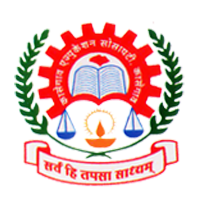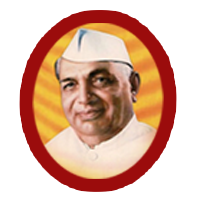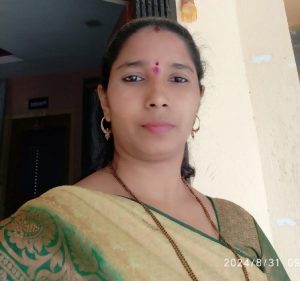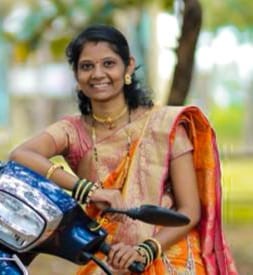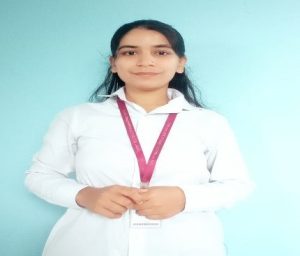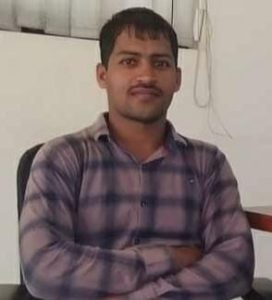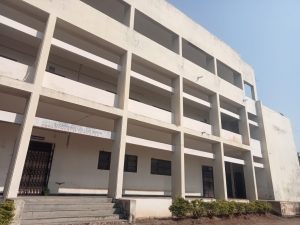
“Computer Science Empowers Students to create the world of Tomorrow.”
The Department of B.Sc. Computer Science established on 2020, has been offering the UG program to provide students with in-depth knowledge of current techniques, skills and cutting-edge technologies in computer science.
This programme will enable the students to gain broad knowledge in core areas, proficiency in analysis and synthesis of solutions for application development.
To groom the students as outstanding professionals in accordance with corporate expectation. B.Sc. Computer Science is one of the most popular programs in the IT domain. This field has the potential to propel your career as a computer scientist or an information systems manager or a networking specialist whose job is to draw the technological roadmap for the organization, ensure efficient management of the available computer facilities, handle smooth functioning of the local area and wide area networking, implement cyber security systems, look after software and hardware system upgrading, and manage system designing and technical analysis for the organization.
It is a three-year long program and has been specifically designed for aspirants looking for a career in computers. The course covers all aspects of computers right from the basic fundamentals of computers to database systems and advanced courses like C,C++,Data structure, C#, ASP.NET, Java, python, PHP, HTML, Script, Linux etc.
Eligibility: A pass in the Higher Secondary Examination or an Examination accepted as equivalent, subject to such conditions as may be prescribed there for.
Intake: 120
Career prospects: On the successful completion of the program, one can start working as:
- Systems Analyst
- Information Technology Manager
- Software Programmer
- Network Programmer
- Cyber Security Manager
- Computer Graphics
- Database Manager
- Software Testing
Career Pathways
- Take up a career as a Programmer, Software Developer, Software Engineer, Multimedia Programmer, Web Designer, Website Developer, etc.
- Work as Database Developer/Administrator, Network Architect, and Systems Analyst in different industry sectors.
- Work as Information Systems Manager in the ICT department of the organization.
- Take up a career as Data Analyst, Data Engineer, Data Scientist, AI & Machine Learning Engineer, etc.
- Work as IT consultant to advise clients on the planning, design, installation, and usage of information technology systems
- Work as cyber security consultant or information Security Specialist
- Work as Multimedia Programmer with advertising, gaming, and entertainment industries.
- Games developers developing games for personal computers, games consoles, social/online games, arcade games, etc.
- Pursue careers in Academics and Research
Mrs. M. S. Patil. Qualification: M.C.A., M.Sc. (Maths), B.Ed. Designation: Asst. Professor Experience: 11 Years |
|
Mrs. T. M. Awati. Qualification: M.C.A. Designation: Asst. Professor Experience: 2 Years |
|
Miss. N. N. Patel. Qualification: M.C.A. Designation: Asst. Professor Experience: 1 Years |
|
Mr. D. B. Mane. Qualification: M.Sc. Designation: Lab Assistant Experience: 5 Years View Detailed Profile |
|
Mr. M. R. Avaghade. Qualification: B.A. Designation: Peon Experience: 2 Years View Detailed Profile
|
|
Facilities:
- WIFI-Campus
- Beautiful Campus in the Heart of Ashta city
- Good Infrastructure
- Well Equipped Electronics Laboratory
- Excellent Result
- Highly Qualified & Experienced Teaching Staff
- Digital Classroom
- Disciplined and Well Maintained Academic Environment
- Well Equipped Library
- Well Equipped Gymkhana
- Extra – Curricular Activities
- Exposure to Industry by Industrial Visits
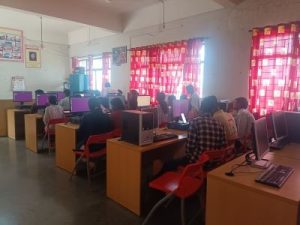
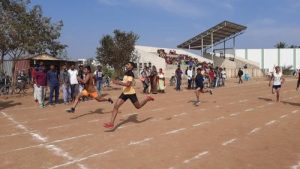
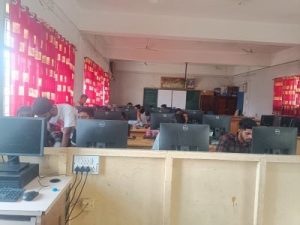
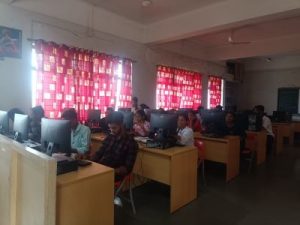
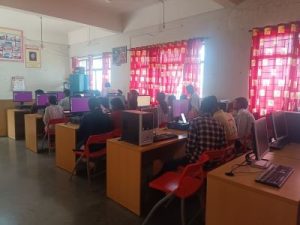
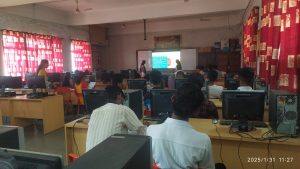
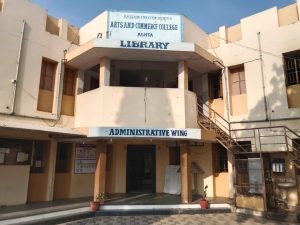

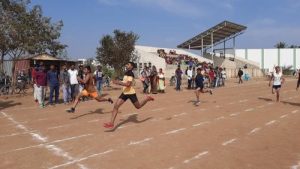
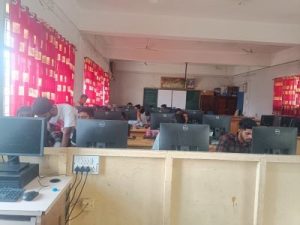
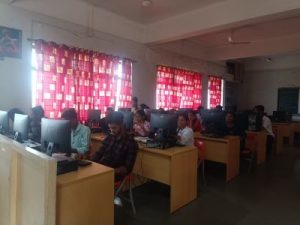
B.Sc. Computer Science (Optional) – I (As Per NEP 2.0 Implement from AY 2024-25)
STRUCTURE OF COURSE
Semester | Subject Type | Course Code | Paper Title | Marks | Credits | Lectures Per week (60 min.) |
SEM – I | Major | DSC – I | Basics of C Programming | 50 | 02 | 02 |
DSC – II | Database Concepts | 50 | 02 | 02 | ||
DSC Pract. – I | Practical Based on DSC – I and DSC – II | 50 | 02 | 04* | ||
Minor | MINOR – I | Basics of C Programming | 50 | 02 | 02 | |
MINOR – II | Database Concepts | 50 | 02 | 02 | ||
MINOR Pract – I | Practical Based on MINOR – I and MINOR – II | 50 | 02 | 04* | ||
OE | OE – I | English Usage | 50 | 02 | 02 | |
IKS | IKS | Interdisciplinary Course In Generic IKS | 50 | 02 | 02 | |
SEM – II | Major | DSC – III | Advanced C Programming | 50 | 02 | 02 |
DSC – IV | Advanced Database | 50 | 02 | 02 | ||
DSC Pract. – II | Practical Based on DSC – III and DSC – IV | 50 | 02 | 04* | ||
Minor | MINOR – III | Advanced C Programming | 50 | 02 | 02 | |
MINOR – IV | Advanced Database | 50 | 02 | 02 | ||
MINOR Pract – II | Practical Based on MINOR – III and MINOR – IV | 50 | 02 | 04* | ||
OE | OE – II | Improving Reading Comprehension in English | 50 | 02 | 02 | |
VEC | VEC | Democracy, Constitution And Election | 50 | 02 | 02 |
B.Sc. Computer Science (Optional) – II (As Per NEP 2020)
STRUCTURE OF COURSE
Sr. No. | Paper | Name of Paper | Marks | ||
Theory | Internal | Total | |||
Computer Science (Semester – III) | |||||
1 | DSC-C11 | Web Technology | 40 | 10 | 50 |
2 | DSC-C12 | Object Oriented Programming Using C++ | 40 | 10 | 50 |
Computer Science ( Semester – IV) | |||||
3 | DSC-D11 | Cyber Security Essentials | 40 | 10 | 50 |
4 | DSC-D12 | Data Structure Using C++ | 40 | 10 | 50 |
Practical ( Annual ) | |||||
5 | Practical Paper-II | Computer Science Practical Paper Based on DSC-C11 | 50 (Practical) | – | 50 |
6 | Practical Paper-III | Computer Science Practical Paper Based on DSC-C12 and DSC-D12 | 50 (Practical) | – | 50 |
B.Sc. Computer Science (Entire) – III (As Per NEP 2020)
STRUCTURE OF COURSE
Sr. No. | Paper | Name of Paper | Marks | ||
Theory | Internal | Total | |||
Computer Science (Semester – V) | |||||
1 | DSE-E21 | Core Java | 40 | 10 | 50 |
2 | DSE-E22 | C# Programming | 40 | 10 | 50 |
3 | DSE-E23 | Linux Operating System | 40 | 10 | 50 |
4 | DSE-E24 | Basics of Python | 40 | 10 | 50 |
Computer Science ( Semester – VI) | |||||
5 | DSE-F21 | Advanced Java | 40 | 10 | 50 |
6 | DSE-F22 | ASP.NET | 40 | 10 | 50 |
7 | DSE-F23 | Advanced Linux OS | 40 | 10 | 50 |
8 | DSE-F24 | Advanced Python | 40 | 10 | 50 |
Practical ( Annual ) | |||||
9 | Practical Paper-IV | Computer Science Practical Paper Based on DSE-E21, E22, F21 and F22 | 50 (Practical) | – | 50 |
10 | Practical Paper-V | Computer Science Practical Paper Based on DSE-E23, E24, F23 and F24 | 50 (Practical) | – | 50 |
11 | Practical Paper-VI | Software Project | 100 | – | 100 |
Arts and Commerce College,Ashta is affiliated to Shivaji University, Kolhapur (MS). The Department of B.Sc. Computer Science (Optional) follows syllabus of the courses framed by Board of Studies in Computer Science of the said university.
Programme | Class | NEP 2020 | NEP 2.O |
B.Sc. Computer Science | First Year | ||
Second Year | —– | ||
Third Year | —– |
Program Name-Computer Science (optional) | |
Sr. No. | Program Specific Outcomes |
PSO 1 | To provide opportunities to the students to acquire computer knowledge of latest software & hardware technology. |
PSO 2 | To provide opportunity to students to learn the latest trends in Computer Science. |
PSO 3 | To provide opportunities to the students to develop different software’s using computer programming languages |
PSO 4 | To provide opportunities to the students to do the jobs in IT Industry as software developer, Database administrator, Software tester, Data Scientist etc. and to formulate analyse and solve real life problems faced in IT Industry. |
Program Name – B.Sc.-1 | |
Course Name/paper | Course Outcomes By the end of each of the following course, the students will be able to: |
Paper-I DSC-I:-Basics of C Programming | CO1: Demonstrate a familiarity of computer programming language concepts |
CO2: Understand to develop C programs on Linux platform. | |
CO3: Use basics of C language syntax as identifiers, keywords, variables, data types and operators | |
CO4: Apply the concept of branching, looping, decision-making statements and Array for problem solving. | |
| |
Paper-II DSC-II:-Database Concepts | CO1: Describe the basic concepts of DBMS and various databases used in real applications. |
CO2: Demonstrate the principles behind systematic database design approaches. | |
CO3: Describe the fundamental elements of Relational Database Management Systems. | |
CO4: Use various commands in data languages with example. | |
| |
DSC Pract. – I | CO1: Understand basic structure if C Programming, declaration and usage of variables, use of data type and operators. |
CO2: Implement control structures and array to develop a C program. | |
CO3: Design database for business applications. | |
CO4: Use various commands in data languages on databases. | |
| |
Paper-III DSC-III:-Advanced C Programming | CO1: Understand the concept and importance of pointers in C language. |
CO2: Demonstrate an understanding of functions in problem solving. | |
CO3: Understand working of structure and dynamic memory allocation. | |
CO4: Apply file handling techniques using C language. | |
| |
Paper-IV DSC-IV:-Advanced Database | CO1: Understand various functions and sub queries. |
CO2: Understand various joins and views. | |
CO3: Use the control statements and stored procedures. | |
CO4: Use the cursors and triggers. | |
| |
DSC Pract. – II | CO1: Understand how to reuse code using functions and pointers and MLA functions to allocate memory at run time. |
CO2: Define a structure to declare the data members of different data types according to needs and handles different file handling techniques using C language. | |
CO3: Use of functions, queries, sub queries, joins and views on databases. | |
CO4: Use of stored procedures and triggers on databases | |
| |
Program Name – B.Sc.-2 | |
Course Name/paper | Course Outcomes By the end of each of the following course, the students will be able to: |
| |
Paper-V DSC-C11:-Web Technology | CO1: understand the principles of web design. |
CO2: construct basic websites using HTML and Cascading Style Sheets. | |
CO3: build dynamic web pages with validation using JavaScript. | |
CO4: develop a modern web application that meets the current industry requirement. | |
| |
Paper-VI DSC-C12:-Object Oriented Programming Using C++ | CO1: understand the principles of web design. |
CO2: understand how C++ improves C with object oriented features | |
CO3: learn syntax and semantics of C++ programming language | |
CO4: learn how to write inline functions for efficiency and performance. | |
CO5: learn how to overload functions and operators in C++. | |
| |
Paper-VII DSC-D11:-Cyber Security Essentials | CO1: understand the concept of information security management. CO2: learn different access control methods. CO3: understand wireless network security. CO4: learn cyber security laws and the importance of security audit.
|
Paper-VIII DSC-D12:-Data Structure Using C++ | CO1 : understand the basic concepts such as Abstract Data Types, Linear and Non-Linear Data Structures. CO2: choose appropriate data structures to represent data items in real-world problems. CO3: analyse the time and space complexities of algorithms. CO4 : design programs using a variety of data structures such as array, stacks, queues, and Linked list. CO5: analyse and implement various kinds of searching and sorting techniques. |
| |
Program Name – B.Sc.-3 | |
Course Name/paper | Course Outcomes By the end of each of the following course, the students will be able to: |
| |
Paper-IX DSC-E21:-Core Java | CO1: use the syntax and semantics of java programming language and basic concepts of OOP. |
CO2: apply the concepts of Multithreading and Exception handling to develop efficient and error free code | |
CO3: develop reusable programs using the concepts of inheritance, polymorphism, interfaces and packages. | |
CO4: design and program stand-alone Java applications and GUI | |
| |
Paper-X DSC-E22-:-C# Programming | CO1: understand framework and architecture of .NET. |
CO2: learn common type system of .NET. | |
CO3: learn object oriented concepts of C#.net | |
CO4: learn graphical user interface (GUI) with windows form controls their properties, methods and events | |
| |
Paper-XI DSC-E23:-Linux Operating System | CO1: learn architecture and basics of Linux Operating System. |
CO2: understand the kernel-shell and general purpose utilities. | |
CO3: understand file system of Linux operating system. | |
CO4: learn Process management and Simple BASH Programming. | |
| |
Paper-XII DSC-E24:-Basics of Python | CO1: understand why Python is a useful scripting language for developers. |
CO2: learn how to write loops and decision statements in Python. | |
CO3: learn how to use lists, tuples and dictionaries in Python programs. | |
CO4: use of functions and modules in Python programs. | |
| |
Paper-XIII DSC-F21-Advanced Java | CO1: develop distributed business applications, develop web pages using advanced server-side programming through servlets and Java server pages. |
CO2: demonstrate approaches for performance and effective coding. | |
CO3: learn database programming using Java. | |
CO4: study web development concept using Servlet and JSP. | |
| |
Paper-XIV DSC-F22– ASP.NET | CO1: understand Web server, HTTP request response architecture. |
CO2: learn Web forms and their controls. | |
CO3: learn state management in web forms. | |
CO4: understand ADO.NET Architecture with connection oriented and Disconnected layer. | |
| |
Paper-XV DSC-F23-Advanced Linux OS | CO1: understand the working and use of NANO editor. |
CO2: learn Regular expressions using metacharacters. | |
CO3: learn filters with the help of regular expression. | |
CO4: learn advanced BASH shell Programming. | |
| |
Paper-XVI DSC-F24-Advanced Python | CO1: learn how to use exception handling in Python applications for error handling. |
CO2: makes code more reusable and easier to work with larger programs using oops. | |
CO3: understand Python programming using Django framework. | |
CO4: develop web pages or web applications using Django. | |
Sr .No | Course Name | Year | Link |
1 | Machine Learning | 2022-23 | |
2 | Cyber Security | 2023-24 | |
3 | Django | 2024-25 | View |
Student Centric Activity: Participative Learning
Method Adopted | Outcome |
Group Discussion | Improves presentation skills |
Students Seminar | Improves presentation skills |
Guest Lectures | Improves knowledge |
Poster Presentation | Improves Presentation skills |
Workshop | Improves knowledge |
Student Centric Activity: Experiential Learning
Method Adopted | Outcome |
Field visit | Inculcation of Observation & Monitoring skills |
Student Project | Develop problem solving skills |
Practical Work | Attainment of practical skills |
Value Added Courses | Knowledge Up gradation and Skill enhancement |
Year | B.Sc.-I | B.Sc.-II | B.Sc.-III |
2020-21 | 31 | 0 | 0 |
2021-22 | 16 | 11 | 0 |
2022-23 | 44 | 9 | 11 |
2023-24 | 51 | 36 | 7 |
2024-25 | 59 | 40 | 25 |

Year | Class | Admitted Students | Total Appeared | Present | Absent | Distinction | 1st class | 2nd Class | Pass | Fail | Total Passed | Percentage |
2022-23 | B.Sc.III | 11 | 11 | 11 | 00 | 10 | 01 | 00 | 00 | 00 | 11 | 100 |
2023-24 | B.Sc.III | 07 | 07 | 06 | 01 | 04 | 01 | 00 | 00 | 01 | 05 | 71.42 |

Sr. No | Year | Name | Progression |
1 |
2022-23 |
Basugade Shubham Yuraj |
MCA |
2 |
2022-23 |
Sawalwade Nihal Nitin |
MCA |
3 |
2022-23 |
Gavali Tushar Kiran |
MCA |
4 |
2022-23 |
Karande Rohan Vijaykumar |
MCA |
5 |
2022-23 |
Shinde Omkar Sanjay |
MCA |
6 |
2023-24 |
Basugade Ankita Arjun |
MCA |
7 |
2023-24 |
Bhasme Nikhil Gajanan |
MCA |
8
|
2023-24 |
Khot Sakshi Hanamant |
MCA |
9 |
2023-24 |
Patil Monika Sambhaji |
MCA |
Sr. No | Year | Name | Designation/ Achievements |
1 | 2022-23 | Sushant Surendra Mali | SR. Clerk S.T. Mahamandal |
2 | 2022-23 | Tushar Kiran Gavali | Operator Pharma Company |
3 | 2023-24 | Pranav Manik More | Navi Army Office |
4 | 2024-25 | Jayraj Sudam Gavade | Army Office |
SEMESTER – I
Subject | Study Material | Video Link |
Basic Of C Programming | https://www.codewithharry.com/tutorial/c | |
Database Concepts |
SEMESTER – II
Subject | Study Material | Video Link |
Advanced C Programming | https://www.codewithharry.com/tutorial/c | https://www.codewithharry.com/tutorial/c |
Advanced Database |
SEMESTER – III
Subject | Study Material | Video Link |
Web Technology | ||
Object Oriented Programming using C++ |
SEMESTER – IV
Subject | Study Material | Video Link |
Cyber Security Essentials | ||
Data Structure Using C++ |
SEMESTER – V
Subject | Study Material | Video Link |
Core Java | ||
C# Programming | ||
Linux Operating System | ||
Basics of Python |
SEMESTER – VI
Subject | Study Material | Video Link |
Advanced Java | ||
ASP.NET | ||
Advanced Linux OS | ||
Advanced Python |
